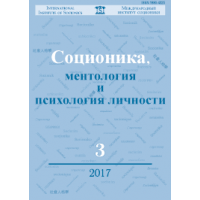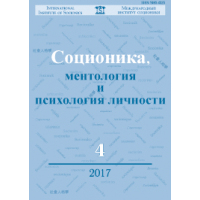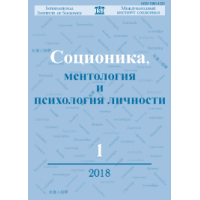Номер № 2/2017 журналу «Соціоніка, ментологія та психологія особистості»
Memoria
Володимир Давидович Єрмак
Соколова О.
Спогад
Шкавро З.М.
В.Д. Єрмак — керівник Київського семінару з соціоніки
Литвиненко І.Ю.
В.Д. Єрмак — видатний соціонік
Дослідження
Егліт І.М.
Предмова
Єрмак В.Д., Румянцева Т.А.
h5>ТИМ і любов
Розглянуто та описано поняття та прояви любові з погляду соціоніки та типів інформаційного метаболізму.
Ключові слова: соціоніка, психологія, любов, переживання, емоція, тип особистості, тип інформаційного метаболізму.
Процький Т.С.
< h4>Соціонічні типи ЛСІ та ЛСЕ. Частина 1: аналіз компаративної таблиці В. ГуленкаРозглянуто питання частої плутанини між соціонічними типами ЛСЕ (PS, «Адміністратор») та ЛСІ (LF, «Інспектор»), за основу статті взято запис у блозі Віктора Гуленка на аналогічну тему, а також багаторічні особисті спостереження за представниками цих двох типів. Дано уточнення за багатьма популярними уявленнями про ЛСЕ та ЛСІ. квадрові цінності.
Математичні методи в соціоніці
Мінаєв Ю.П.
Група перетворень 3D моделей соціонічних типів та її зв'язок з класичними інтертипними відносинами
Розглянуто 3D варіант Моделі А. Центрам осередків, які заповнюються символами інформаційних аспектів, поставлені у відповідність упорядковані трійки декартових координат. Дозволені варіанти розміщення символів ІА по осередках Моделі А були пов'язані між собою операторами перетворень симетрії тетрагональної призми. Ці оператори поставлені у взаємно однозначну відповідність операторам класичних інтертипних відносин.
Ключові слова: Модель А, класичні інтертипні відносини, оператори геометричних перетворень, групи симетрії, ізоморфізм груп, матричний формалізм, канонічне уявлення операторів інтертипних відносин.
Дискусії
Арінічева О.В., Малишевський А.В.
Назад до Юнга: чи є автори цієї статті соціоніками?
Автори викладають основні тези своєї теоретичної концепції, в цілому ряді важливих моментів відмінні від загальноприйнятих положень соціоніки. Ця концепція, на думку авторів, ближча до ідей Карла Густава Юнга, ніж загальноприйнята соціонічна. Наводиться обґрунтування низки тез або відсилання до їх обґрунтування в інших роботах авторів. Стаття містить заклик до конструктивної дискусії.
Ключові слова: інформаційний метаболізм, психологічна дихотомія, соціотип, постулат дискретності, соціонічна модель людини, соціонічна модель інтертипних відносин.
Букалов А.В.
Про статтю О.В. Арінічової та А.В. Малішевського «Назад до Юнга: чи є автори цієї статті соціоніками?&rquo;
Методологічний аналіз основних положень статті О.В. Арінічової та А.В. Малишевського «Назад до Юнгу…» показує, що автори, зводячи соціоніки до деякої власної версії типології, спрощують ряд положень соціоніки, відмовляючись розглядати інформаційну модель психіки, створену А. Аугустінавічюте і прямо випливає з робіт К. Г. Юнга. Зокрема, використовуючи на практиці таблицю інтертипних відносин, вони ігнорують той факт, що вона може бути отримана лише при використанні інформаційних моделей психіки та розгляду їх взаємодій. При цьому вони, пропонуючи свою спрощену модель як повернення до ідей Юнга, також ігнорують частину його власних уявлень у суперечності із заявленою тезою. Це, своєю чергою, може позначатися і ступені ефективності розроблюваних ними практичних методик. Водночас багаторічний практичний досвід авторів, їх досягнення в роботі з авіаційними колективами заслуговує на увагу та осмислення та використання в рамках усієї теоретичної та практичної соціоніки.
Ключові слова: соціоніка, типологія Юнга, цивільна авіація , тип особистості, інформаційна модель психіки, психологія особистості.
Соціоніка 2/2017
- Модель: выпуск журнала «Соционика…»
-
$3.00
- Ціна в бонусних бали: 30
Рекомендовані товари
Соціоніка 1/2017
Номер № 1/2017 журналу «Соціоніка, ментологія та психологія особистості» Дослідження Гол..
$3.00
Соціоніка 3/2017
Номер № 3/2017 журналу «Соціоніка, ментологія та психологія особистості» Дослідження Мед..
$3.00
Соціоніка 4/2017
Номер № 4/2017 журналу «Соціоніка, ментологія та психологія особистості» Соціоніка в сім..
$3.00
Соціоніка 5/2017
Номер № 5/2017 журналу «Соціоніка, ментологія та психологія особистості» Дослідження Гул..
$3.00
Соціоніка 6/2017
Номер № 6/2017 журналу «Соціоніка, ментологія та психологія особистості» Дослідження Шал..
$3.00
Соціоніка 1/2018
Номер № 1/2018 журналу «Соціоніка, ментологія та психологія особистості» Дослідження Ков..
$3.00







